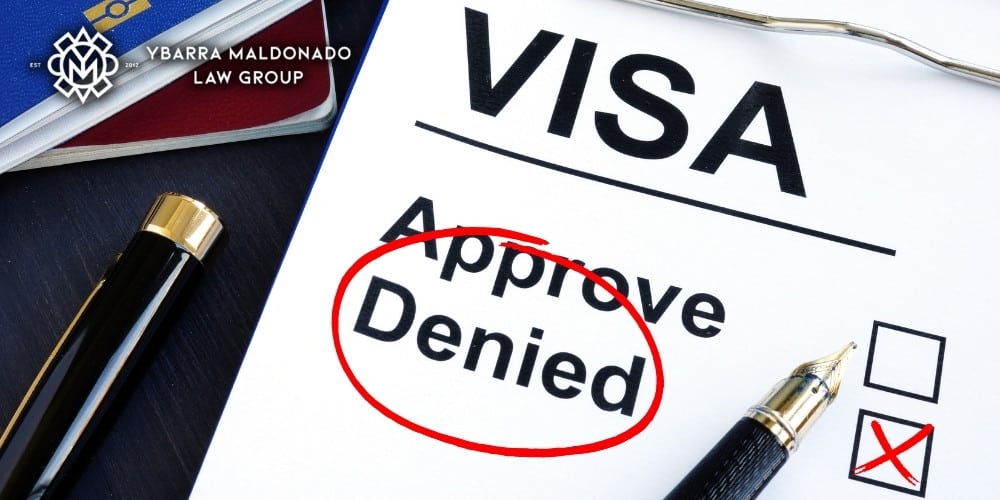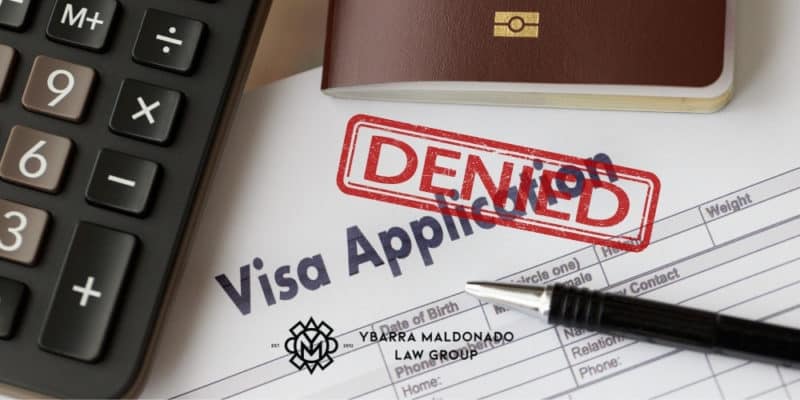Immigration Appeal Lawyer Phoenix, AZ
DON’T HESITATE TO REACH OUT TO US!
Our Law Firm is committed to becoming the best Law Firm for Latino, migrant, and Spanish speaking communities in Arizona.
A Full Guide to Immigration Appeals

Within the context of immigration laws, it is relatively common for petitioners and undocumented persons to receive a denial of benefits. However, these denials can often be appealed with the help of experienced immigration attorneys. Depending on the type of case and appeal, you might have to appeal to the Administrative Appeals Office (AAO), the Board of Immigration Appeals (BIA), or another department. No matter the reason for your appeal, we highly recommend working with an immigration appeal lawyer.
Immigration cases can be extremely complicated, as they require extensive paperwork and a deep understanding of immigration law. At Ybarra Maldonado Law Group, our Phoenix immigration attorneys offer a number of immigration services, including handling appeals. If you submitted a petition or application that was denied, we can help guide you through the process. It can feel daunting to face an immigration judge or an immigration court on your own. Our attorneys are highly skilled when it comes to applying immigration laws to cases and using our knowledge to your advantage. To schedule an appointment with us and establish an attorney-client relationship, please contact our Phoenix law firm at 602-910-4040 today.
What Is Immigration Appeal?
If you receive an unfavorable decision regarding your immigration case, you can file an appeal or a motion to dispute it. An appeal allows you to request an immigration review of the decision on your case. Most appeals will go to the United States Citizenship and Immigration Services Administrative Appeals Office (AAO) or to the Board of Immigration Appeals (BIA).
Maybe you filed for temporary protected status or relief from a removal order. In this case, your appeal will likely go before the immigration courts. When non-citizens face immigration judges, it is extremely important to have qualified legal representation. Without a knowledgeable attorney at your side, you are at the mercy of the complex and convoluted immigration courtroom proceedings.
It’s important to note that, depending on the type of appeal, you might have to submit the appeal to one of several different departments. You may even need to interact with more than one throughout the duration of your case. In the next section, we outline some of the most common types of immigration appeals and the departments that hear appeals of those types.
Types of Immigration Appeals

Six primary types of immigration appeals exist. The decision maker on the appeals varies by case type. Below, we outline each governing body that decides appeals of different types.
Administrative Appeals Office (AAO) Appeals
The USCIS Administrative Appeals Office handles appeals for the following immigration case types.
- Adjustment of status applications
- Temporary protected status applications
- E2 Visa
- H1B Visa
- Temporary worker petitions
- Other special immigrant petitions
Note: The AAO does not handle appeals of decisions made by officials within the United States Department of Homeland Security.
If you received a denial for any of the above, you must file a Form I-290B with the AAO within 30 days of receiving the unfavorable decision. The legal team at YMLG can help you appeal USCIS decisions by filling out and submitting the form, as well as crafting a strong argument in your favor.
Board of Immigration Appeals (BIA)
In terms of immigration law, the Board of Immigration Appeals is the highest administrative body that renders decisions. The BIA hears appeals regarding the following case types.
- Final decisions in deportation and removal cases
- Form I-130 denials
- Immigration bond decisions given by immigration judges
Many immigration cases begin with a petition or an application. Then, petitioners will attend a hearing before an immigration judge. After the immigration judge’s decision is rendered, applicants have the opportunity to appeal the decision to the BIA. Again, you must appeal the decision within 30 days of receiving it. Keep in mind that most appeals involve written arguments rather than oral arguments. This means that you likely won’t need to go to immigration court.
Criminal Immigration Law
If an immigrant or non-citizen is convicted of certain crimes, they may face removal proceedings. An immigration criminal lawyer with Ybarra Maldonado Law Group will help you fight for your legal rights against deportation. Deportation defense is one of many immigration practice areas that we handle, and we have years of experience in this area. We will aggressively represent your immigration appeals case before an immigration judge and fight to keep you in the country.
Writs of Habeas Corpus, Writs of Mandamus, and the Administrative Procedure Act
First, let’s define the above terms. Then we’ll go into how they apply to immigration appeals.
- In immigration law, a Writ of Habeas Corpus serves to petition a federal court for an immigrant’s release from a detention center if they have been detained for six months after their deportation order. In other words, non-citizens who are in detention for unnecessarily long periods of time while awaiting the results of a pending case have the right to argue their case.
- A Writ of Mandamus is a court order from a higher authority to a lower authority. It basically compels the lower authority to follow through with their official duties. These Writs mostly help with stalled cases within the USCIS.
- The Administrative Procedure Act (APA), according to the EPA, “governs the process by which federal agencies develop and issue regulations.” The APA comes into play in immigration court cases when an immigration department or an immigration judge’s decision contradicts a current law. It can be used to challenge a case outcome when a judge renders a decision that does not consider all the facts of the case.
U.S. Circuit Court of Appeals
Another avenue for immigration appeals is via the United States Court of Appeals. Generally, to reach this stage, an immigrant must have applied for asylum or for deportation relief and been denied by the judge. They must have also appealed that original decision with the Board of Immigration Appeals. If the original decision is upheld by the BIA, this is when someone can appeal for the final time with the circuit court. Keep in mind that these final appeals must be filed within 30 days of the denial.
It’s important to know which circuit court you will submit your appeal to. People in San Diego, San Francisco, and Phoenix will file in the Ninth Circuit Court, while someone in Chicago will file in the Seventh Circuit Court.
Motions to Reopen and Motions to Reconsider
These two motions are alternatives to the regular process of immigration appeals. Both motions have deadlines by which you must submit them. A motion to reopen must be filed within 90 days of receiving the decision. A motion to reconsider must be filed within 30 days of receiving the decision.
If you file a motion to reopen, you are essentially asking the government to reopen your case, taking into consideration new facts or new circumstances. In a motion to reconsider, you ask the government to reconsider its decision on the basis that the original decision was incorrect. However, you must be able to show that the decision was incorrect based on a misapplication of immigration law or based on the evidence in your case. This may involve the Executive Office for Immigration Review, as they administer the entire immigration court system. This does not mean that they conduct courtroom proceedings.
Can I Appeal an Immigration Decision?
Yes. According to the USCIS, the Administrative Appeals Office handles appeals for approximately fifty different immigration case types. Importantly, the decisions that the AAO renders are non-precedent decisions. This means that the decisions will only affect those involved in the case, not USCIS policy. Examples of cases that the AAO handles include the following.
- Employment-based immigrant and non-immigrant Visa petitions
- K-1 Fiance Visa
- Family Preference Immigrant Visas
- Waiver of inadmissibility
- I-212 Waiver
- Orphan petitions
- T Visa and U Visa
- Naturalization service applications
How Do I Appeal an Immigration Decision?
When you receive your denial letter, the Board of Immigration Appeals or other offices that rendered the decision will explain their reasons for the denial. This is helpful, as some of the reasons for denials are easy to correct. For example, maybe you submitted the incorrect application for what you’re trying to achieve. In this case, you and your attorney can correct the mistake or supply any documents that you failed to submit the first time.
How Long Do I Have to Appeal an Immigration Decision?

Most cases require that you submit your appeal within 30 calendar days of the unfavorable decision. Generally, the written decision will include information about the deadline to submit your appeal. AAO and BIA decisions specifically must be appealed within 30 days. While other decisions have longer deadlines, it’s a good idea to submit your appeal as soon as possible.
How Long Does It Take to Appeal an Immigration Case?
This greatly depends on the facts and nature of your individual case. However, you can expect to wait anywhere from six months to a year at least. If your case is highly complex, you will likely wait longer. Additionally, the Board of Immigration Appeals and other related departments are often bogged down in recent years. Therefore, it’s safe to assume that your case will take longer than anticipated.
Can a Lawyer Speed Up My Immigration Case?

Yes and no. Attorneys can’t speed up the processes of other agencies and departments, but they can help the overall process go more smoothly. Our knowledge of immigration law is critical in developing the right strategy for your case. The process is undoubtedly easier and less stressful with the help of an experienced attorney, but they can’t change how much time other departments will need to review your appeal.
How Can an Immigration Appeal Lawyer Help My Case?

From the very beginning of your immigration case, an immigration lawyer will help you seek justice for yourself and your family. Not only can we help you fill out your initial application, but we can also help you in the event of a denial. It’s never a good idea to face the Department of Justice or a district court judge without experienced legal counsel. With our experience in handling immigration appeals, the legal team at YMLG will help you move forward in your case relatively smoothly. Even if your case encounters a few bumps in the road, we’ll be there to guide you through the complexities of the immigration court system.
Do You Need Help With Your Immigration Appeals Case?
At Ybarra Maldonado Law Group, we take great pride in serving our clients and their families, helping them navigate the confusing immigration processes. We understand that the system isn’t always friendly for those who have little experience with it. That’s why we use our years of experience and deep understanding of the field to assist immigrants and their families. If you received a denial of your application or petition, we’re here to help you appeal it. To schedule an appointment for a complimentary case evaluation, please call 602-910-4040 today. Remember that any confidential or sensitive information you give us will remain confidential.







